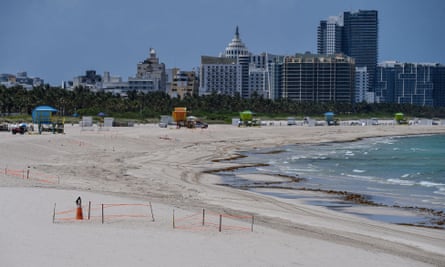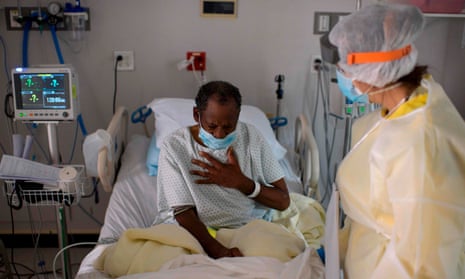Two prominent Texas mayors have warned that hospitals in their cities will be “overwhelmed” by cases of Covid-19 inside two weeks, even as Donald Trump continues to portray the coronavirus resurgence nationwide as the embers of a fire he is steadily extinguishing.
“If we don’t get our hands around this virus quickly, in about two weeks our hospital system could be in serious, serious trouble,” Houston mayor Sylvester Turner said on Sunday, the last day of a Fourth of July holiday weekend during which experts feared many Americans would disregard public health guidelines.
“I mean, overwhelmed. Right now we have bed capacity. But let me just tell you, the major problem [is] the staffing. We can always provide additional beds but we need the people, the nurses and everybody else, the medical professionals to staff those beds. That’s the critical point right now.”
Turner’s comments, to CBS’s Face the Nation, came as hospitalisation and Covid-19 positivity rates climb in his city.
Texas, along with Arizona and Florida, has become a hotspot for the infection, recording six straight days of confirmed new cases above 5,000. On Saturday it set a record of 8,258 cases and 7,890 hospitalisations.
“A month ago, one in 10 people were testing positive,” said Turner, a Democrat. “Today, it’s one in four. The number of people who are getting sick and going to the hospitals has exponentially increased. The number of people in our [intensive care] beds has exponentially increased.”
According to researchers at Johns Hopkins University, the US has now confirmed nearly 2.9m coronavirus cases, and nearly 130,000 deaths. States which were early hotspots, New York prominent among them, are pausing or proceeding cautiously with reopening plans.
At the White House on Saturday, Trump attempted to downplay the resurgence of the virus, claiming without evidence the infection was “99% harmless”.
“Our strategy is moving along well,” he said. “It goes out in one area, it rears back its ugly face in another area. But we’ve learned a lot. We’ve learned how to put out the flame.”
The president’s words angered Steve Adler, the Democratic mayor of Austin.
“I understand he has a tough job, but it is dangerous not to be sending a clear message to Americans, to folks in my town,” he told CNN’s State of the Union.
“We have the Fourth of July weekend and we need everybody wearing masks. And when they start hearing that kind of ambiguous message coming out of Washington, there are more and more people that won’t wear masks, that won’t social distance, that won’t do what it takes to keep a community safe.
“And that’s wrong, and it’s dangerous. I just have to hope that people aren’t going to listen to that, and they will stay focused on what they’re hearing here more locally.”
Hospitals in Austin, Adler said, were facing a nearly identical crisis to those in Houston.
“The conduct in our city started changing about two weeks ago,” he said. “If we don’t change the trajectory, then I am within two weeks of having our hospitals overrun. And in our ICUs, I could be 10 days away from that.”
Greg Abbott, the Republican governor of Texas, implemented a statewide mask mandate last week, a move Adler said he welcomed but wished had come sooner. On Sunday, Abbott’s office said more than 400 cases of the antiviral drug remdesivir had been distributed to 157 hospitals and 600 medical staff and 16 ventilators had been deployed to areas of greatest need in southern Texas.
Elsewhere over the holiday weekend, pressure on hospital space mounted. Florida, where beaches in the populous south-eastern counties of Miami-Dade, Broward and Palm Beach were closed to deter large gatherings, recorded 10,059 new cases on Sunday, edging the state past 200,000 cases only two weeks after it reached 100,000.

Four of 11 hospitals in Pinellas county had run out of intensive care beds on Sunday, according to the Florida agency for healthcare administration, following weeks of warnings that hospital space across the state was dwindling.
In Miami-Dade county, which implemented its own mask requirement after Republican governor Ron DeSantis resisted growing calls for a statewide mandate, more patients (138) were admitted to hospital than discharged (125). The total inpatient count of 1,538 is almost double the 22 June tally of 776.
“It’s clear that the growth is exponential at this point,” Francis Suarez, the Republican mayor of Miami, told ABC’s This Week. “You know we’ve been breaking record after record after record, all the last couple of weeks.
“The city of Miami was the last city in the entire state of Florida to open. I was criticised for waiting so long. But there’s no doubt that when we reopened people started socialising as if the virus didn’t exist.”
Arizona reported 3,536 new cases on Sunday, an increase of 841 from the day before.
“We opened way too early in Arizona,” Kate Gallego, the Democratic mayor of Phoenix, told ABC. “We were one of the last states to go to stay-at-home and one of the first to reemerge.”
